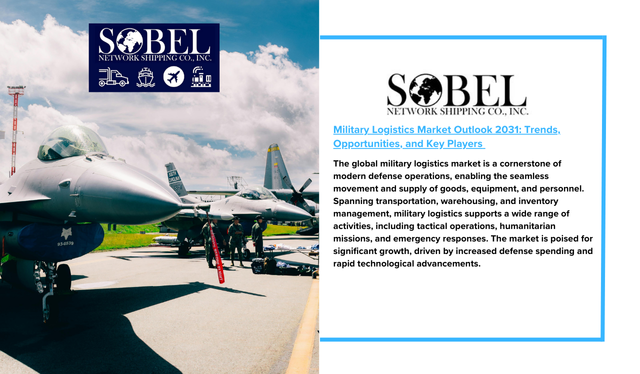The global military logistics market is a cornerstone of modern defense operations, enabling the seamless movement and supply of goods, equipment, and personnel. Spanning transportation, warehousing, and inventory management, military logistics supports a wide range of activities, including tactical operations, humanitarian missions, and emergency responses. The market is poised for significant growth, driven by increased defense spending and rapid technological advancements.
Key Market Highlights
- Market Growth Drivers:
Rising geopolitical tensions and escalating defense budgets are fueling the demand for efficient logistics systems. Technological innovations, such as automation and artificial intelligence, are reshaping logistics management, enhancing speed, reliability, and cost-efficiency. - Technological Integration:
The integration of unmanned systems, drones, and AI-driven analytics is revolutionizing logistics capabilities. These technologies streamline operations, optimize supply chains, and ensure rapid deployment in critical scenarios. - Cybersecurity Focus:
As logistics networks become increasingly digitized, robust cybersecurity measures are essential to safeguard sensitive military data and infrastructure.
Regional Analysis
- North America:
Leading the market, with the United States at the forefront due to its extensive defense budget and global military presence. - Europe:
Major investments in military modernization by the UK, France, and Germany drive regional growth. - Asia-Pacific:
Rapid expansion in China and India, fueled by increased defense budgets and logistics infrastructure upgrades, positions this region as a key growth area. - Middle East and Africa:
Geopolitical tensions and military conflicts necessitate robust logistics support, creating growth opportunities in this region. - Latin America:
Gradual market expansion is evident, driven by advancements in defense capabilities in countries like Brazil and Argentina.
Opportunities in Military Logistics
- Technological Advancements:
- Adoption of AI, IoT, and blockchain enhances supply chain transparency.
- Automation reduces costs and improves operational efficiency.
- Unmanned Systems Integration:
- Use of drones and UAVs for cargo transport and surveillance offers cost-effective solutions for remote deployments.
- Strategic Partnerships:
- Collaboration between private logistics firms and defense organizations is fostering innovative solutions.
- Sustainability Focus:
- Eco-friendly technologies and materials are gaining traction, aligning with global sustainability goals.
Market Challenges
- High Costs:
Operational and capital investment requirements remain a significant barrier. - Geopolitical Instability:
Regional conflicts and regulatory hurdles complicate logistics operations. - Technological Complexity:
Integrating advanced systems into existing supply chains can lead to delays and increased costs.
The Future of Military Logistics
The military logistics market is set to evolve significantly by 2031. Automation, robotics, and AI will play pivotal roles in reducing operational costs and enhancing deployment speed. UAVs are expected to see widespread adoption for cargo transport and reconnaissance. Real-time digital monitoring platforms will improve decision-making, while strengthened international collaborations will enhance logistics efficiency.
Key players, including AECOM, ANHAM FZCO, Aselsan A.S, BAE Systems PLC, DynCorp International, and Lockheed Martin, are driving innovation and expanding their global reach to meet the demands of modern military operations.
Conclusion
The global military logistics market is on a trajectory of sustained growth, driven by rising defense expenditures and technological innovation. As militaries worldwide prioritize operational readiness and supply chain resilience, logistics capabilities will continue to be a critical focus area. Emerging technologies and strategic partnerships are set to redefine the future of military logistics, ensuring efficiency, agility, and sustainability in defense operations.
For a detailed analysis, download the full research report here.


